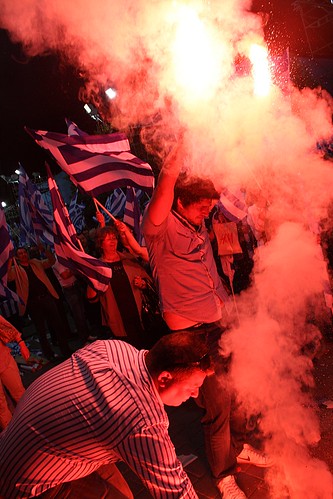Evangelos Venizelos, a photo by Teacher Dude's BBQ on Flickr.
This time my prediction proved right and Alexis Tsipras this morning told the Greek president that his SYRIZA (Radical Left Coalition) party is unable to form a new government. This means that the task now falls to the head of the centre left PASOK party, Evangelos Venizelos, however, the chances of Venizelos, whose party lost 70% of its parliamentary seats in Sunday's elections, faring any better than Tsipras or the conservative leader, Antonis Samaras are slim.
It is becoming quite obvious that under the present economic conditions any party working with PASOK or New Democracy in order to form a pro-austerity government is signing their own political death warrant and with elections likely in June that mitigates against any agreement.
So what happens next?
Tsipras used his time in the political spotlight to further underline his party's opposition to the terms of the Greek bailout deal and made it quite clear that if the Radical Left took power they would play a very different game from their immediate predecessors. Also in a parliamentary address broadcast live on TV last night at 9pm he reached out to other groups on the left, both trade unions and political parties in what could be called the creation of a united front in any new national elections. If SYRIZA can attract some of the smaller left wing parties and get the Ecologists to sign up there is a good chance that they may overtake the conservatives in the polls. In addition the language Tsipras used was also aimed at the supporters of the Greek Communist party (KKE) who may be persuaded to switch allegiances. There are rumblings of discontent amongst KKE rank and file members who are unhappy with Aleka Papariga's unwillingness to form wider political alliances.

The prospect of a radical left wing, anti-austerity government in Athens has, predictably enough provoked a strong reaction by both local and European elites. Already the local media are running scare stories blaming political instability for falling tourism bookings and saying that ΣΥΡΙΖΑ would use power to grab people's savings. In a similar vein, both Samaras and Venizelos claimed that such a government would get the country kicked out of the Eurozone and the EU and would lead to economic collapse.
On the European level last night the EU said that it was delaying payment of part of the latest bailout tranche, of the 5.2 billion euros promised, only 4.2 billion will be released today, the remaining 1 billion destined to fill holes in the Greek government's day to day running costs will be paid at the some unspecified time in June. Such crude blackmail attempts underline the sense of unease being felt in Brussels and Berlin at the prospect of Greece defying creditors and possibly derailing the entire EU austerity program.
There is an other possibility as the BBC's Paul Mason pointed out that in light of the elected parties being unable to form a government and unelected technocratic caretaker government would be charged with passing the latest cuts and tax hikes scheduled for June and July. Such a move would plunge the country into even more political turmoil as people would see it as a clear defiance of the anti-austerity message the national elections sent. In such a climate the legitimacy of the parties participating in such a government would be shredded, opening up opportunities to other less mainstream parties, including the neo-Nazi Golden Dawn who already have 21 MPs in parliament.

Once again the Greece and the EU are playing a game of high stakes poker, upping the ante and hoping that the other will fold first. However, unlike previous round the mood in Greece has changed dramatically with the worsening economic crisis and threats of dire social consequences of failure to comply no longer hold such sway. With youth unemployment at 50% and the thousands of businesses closing every week, for many the worst has already arrived.

No comments:
Post a Comment